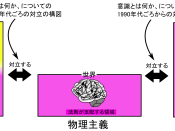Concerning Dualism.
I would like to take this opportunity in order to bring forth some charges against the concept of Dualism. Essentially, Dualism, or Pluralism, is the belief that their are two types of things which compose a human being - body and mind. This is opposed to Monism, a belief in only one substance - with the general antithetical view being that humans are merely physical creatures (the exception being the rare few who believe in the mind only).
With particular reference to doctrines by Plato and Descartes, the imperative task is to dissect the key arguments found in these papers and come to a conclusion about the validity of the arguments which represent Dualism. To contextualise the discussion, it is crucial to remember that both of these doctrines were written with the reign of God(s) having a secure spot in the philosophers' respective societies - antithetical views to the mind/body problem did not come about till much later in the piece - when fundamentalism lost its reign in European society; the concept of God became challenged and rejected on a wider platform.
The first extract is Plato's Phaedo, capturing a discussion between Socrates and his disciples concerning the nature of the soul. Here we are presented with Socrates' theory of opposites, which, briefly, goes as such: An opposite will never admit its opposite. Also, anything accompanied by a form which has an opposite, and meets that opposite, will not admit the opposite of that form - for example, ten will not meet the form of odd.
Based upon this type of reasoning, Socrates gets his companion in truth-seeking, Cebes, to admit and agree upon that the soul is immortal - Life is opposite to death, the soul does not admit death, so hence,


